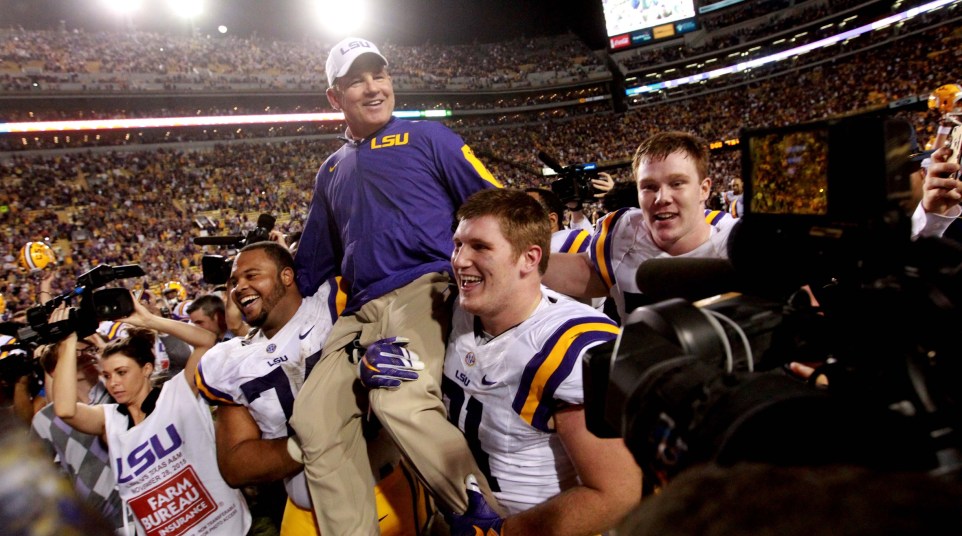
Position-by-position edge: LSU vs. Texas Tech
Taking a position-by-position look at LSU vs. Texas Tech, here’s what to watch for in the Dec. 29 AdvoCare V100 Texas Bowl between the Tigers and the Red Raiders:
QUARTERBACK — Texas Tech: Big advantage to the Red Raiders here. Texas Tech QB Patrick Mahomes is fourth in the nation in passing with 4,283 yards. He’s thrown for 28 touchdowns and has been intercepted 12 times in 486 pass attempts this season.
LSU cannot compare at this position. Tigers QB Brandon Harris has digressed since the beginning of the season, completing just 7 of 21 passes for 83 yards in the regular season finale against Texas A&M. He did manage to throw for 1,904 yards and 12 touchdowns for the year, however, while being intercepted just five times in 254 attempts.
RUNNING BACKS – LSU: Not many teams will compare with LSU’s running game. Leonard Fournette, the Tigers’ single-season rushing leader with 1,741 yards (458 carries, 18 TDs), gets the nod here. The sophomore has run behind excellent blocking, especially through the first half of the season. Injuries have slowed the attack over the second half of the season and the advantage isn’t as big as it could be.
That’s not to say Texas Tech doesn’t have a good running back, because they do. Deandre Washington has rolled up 1,455 yards on the ground with 14 touchdowns on 223 carries. Yes, he’s benefited from the Red Raiders’ exceptional passing game, but if overlooked he can hurt you with his legs and he can catch a pass out of the backfield. Washington totaled 34 catches for 304 yards and two touchdowns.
WIDE RECEIVERS, TIGHT END – Texas Tech: The Red Raiders were dealt a blow when Devin Lauderdale, their second-leading receiver, was suspended from the team and will miss the bowl game. But leading receiver Jakeem Grant remains. LSU has nothing to compare with Grant’s 80 catches for 1,143 yards and seven touchdowns. Plus, Ian Sadler (39 receptions, 551 yards, 3 TDs) and Reginald Davis (26 catches, 499 yards, 7 TDs) are more than capable targets.
LSU has great receivers in Malachi Dupree (39 receptions, 602 yards, 6 TDs) and Travin Dural (28 catches, 533 yards, 3 TDs), who still just might follow in the footsteps of NFL stars Odell Beckham, Jr. and Jarvis Landry. Getting them the ball is a different story. It will be interesting to see if LSU head coach Les Miles and OC Cam Cameron open up that passing game against a porous Red Raiders secondary.
OFFENSIVE LINE – Texas Tech: The Red Raiders rank second in the nation in total offense, averaging nearly 600 yards per game. You don’t put up those kinds of numbers without a solid offensive line to block for.
LSU has one of the best offensive lines in the country, but injuries have taken their toll. Still, the Tigers have as many as three players – one senior and two juniors – who could be selected in this year’s NFL draft. So while Texas Tech may hold an advantage here, it is a razor-thin one, if at all.
DEFENSIVE LINE – LSU: The Tigers’ defensive front has held up nicely this season. Ranked fourth in the SEC against the run, LSU allows an average of just 131.5 yards per game. Lewis Neal leads the Tigers with seven sacks off the edge.
When you talk Texas Tech football, defense isn’t at the forefront of the conversation. The Red Raiders yielded an average of 271.8 yards rushing per game. That’s not last in the nation, but it’s second-to-last in the nation.
LINEBACKERS – LSU: The Tigers are solid at linebacker. Deion Jones and Kendell Beckwith lead the team in tackles with 80 and 65 respectively. Jones has 10 tackles for loss, including four sacks. He also has two interceptions this season, returning one for a touchdown.
Texas Tech doesn’t compare, but is not without talent. However, Dakota Allen the Red Raiders’ second-leading tackler with 84 stops, including 44 solo and six for loss, is questionable for the game with an injured ankle.
SECONDARY – LSU: The Tigers hold the edge here, almost by default. Texas Tech is 112th in the nation against the pass. The Red Raiders yield an average of 268.3 yards per game through the air.
Conversely, the Tigers are more toward the middle of the pack in pass defense. Although this will be LSU’s toughest test, the Tigers have given up an average of only 211 passing yards per game. Safety Jamal Adams leads the group with 56 tackles (5.5 for loss), has four interceptions to his credit and also recovered a fumble.
